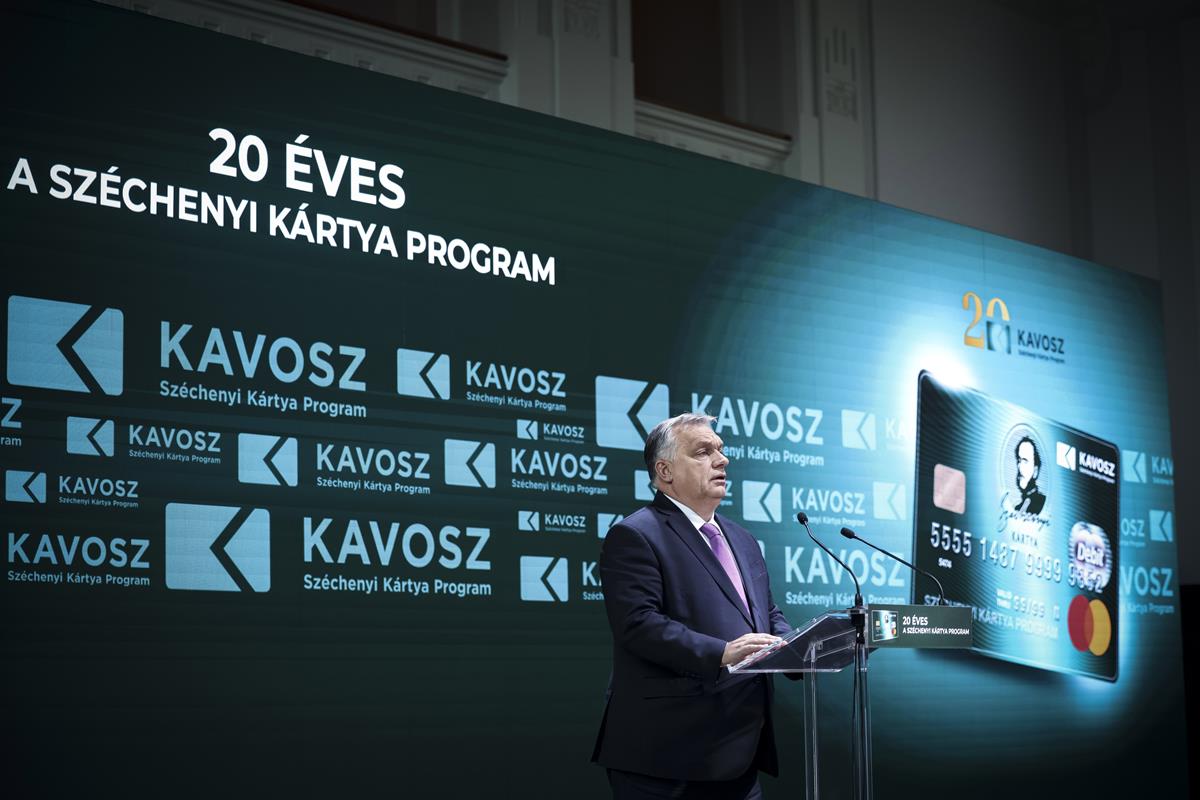Orbán: the market is not sacred, state intervention may be necessary in times of need

The government will support the Széchenyi Card scheme with 290 billion forints (EUR 712.6m) next year after receiving 130 billion this year, Prime Minister Viktor Orbán said on Tuesday.
At an event celebrating the scheme’s 20th anniversary, Orbán said the doubling of support was not purely out of “good will” as interest rates “have increased and so has the subsidy on interest”.
The prime minister said that since “a difficult year lies ahead of us”, the government may well have decided against investing “such a large amount in the subsidy” for the state scheme that provides cheap credit to businesses.
In addition, 220 billion forints is being set aside in the budget for small and medium-sized firms whose operations are energy intensive, and a factory rescue scheme will also be announced, he said.
The scheme aims to ensure there are successful Hungarian enterprises, Orbán said “because then Hungary will be a Hungarian country”. As well as large foreign companies, he added, there was a need for a “Hungarian entrepreneurial strand that’s broad, strong and stable”.
Meanwhile, commenting on the war in Ukraine, the prime minister said countries that supplied weapons were drifting ever closer to war, while sanctions were shaking the European economy and stoking inflation.
Orbán said it was good that Hungary was avoiding recession and staying out of war. “We can also be glad” that the aim to bring inflation down to the single digits by the end of 2023 is viable, he added.
He also said the government was successfully protecting families from bearing the burden of huge energy bills.
The prime minister said the market was not sacred, and though it has laws, state intervention may be necessary in times of need. “We’re facing a year when the Hungarian economy won’t be successful without a strong and timely” state support, he said.
Orbán said Europe’s entire industry was now threatened by the energy crisis and the bloc must work out a new economic structure.
Commenting on the budget, he said that whereas the 2023 budget has been adopted, it must be adapted to the current situation in light of intervening developments.
Between 2015 and 2021, Hungary outpaced EU growth, indicating the essential robust health of the Hungarian economy, he said. But the country is now weighed down by high energy prices, inflation and interest rates, he noted.
Energy, Orbán said, was the hardest challenge, noting that every household received an energy subsidy of 180,000 forints each month. “It’s vital we maintain this support,” he said.
Source: MTI





Bringing inflation down how exactly…..? And he’s 100% confident we’ll avoid a recession…..? Wonder what an independent economic forecast would show.
For you nothing is sacred…as long as it keeps you in power.
This is the “outside looking in” forecast, as opposed to Politician spin:
“A sharp slowdown is expected”
“This baseline forecast is fraught with downside risks. Energy supply disruptions could have a large economic impact as Hungary has limited possibilities to substitute oil and gas imports from Russia in the short term. High energy prices might also endanger the medium-term investment plans of Hungary’s energy intensive manufacturing sector. Finally, persistently high inflation or deteriorating financing conditions might require a tighter economic policy stance.”
“Real wages to fall instead of employment … high inflation is projected to reduce real wages in 2023.”
“Non-energy inflation is also running high”
“HICP inflation accelerated to 20.7% in September after the price cap on residential energy was partly lifted. Non-energy inflation was the highest in the EU at 19.2%, due to domestic inflationary pressure and currency depreciation. Inflation is set to remain high…”
“Public finances enter a challenging period”
“Risks to the fiscal outlook are on the downside, stemming from potentially large central bank losses and uncertainty surrounding financing conditions.”
https://economy-finance.ec.europa.eu/economic-surveillance-eu-economies/hungary/economic-forecast-hungary_en